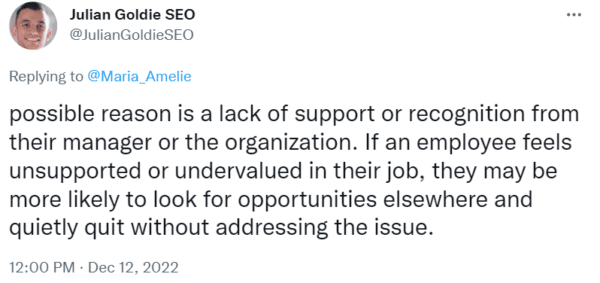“I’m just gonna come in and do my job. Still doing all my deliverables, but not a day early, not doing anyone else’s job on top of mine, not coming in a minute before 9 a.m. and not staying a minute later than 5 p.m. I don’t care anymore.”
This is quiet quitting.

40% of the global workforce is looking to leave their jobs in the next 3 to 6 months, according to “To quit or not to quit” by Mckinsey and Company. The difference will be in how they will choose to leave, which will also have significant effects on businesses.
While the term “quiet quitting” has been trending recently, there is a misunderstanding that must be addressed regarding the concept.
Setting boundaries, such as declining to work excessive hours, weekends, or being on call for non-urgent requests outside of regular business hours, is not a form of quiet quitting. Rather, it is a matter of self-respect and taking care of one’s own well-being.
True quiet quitting occurs when an employee, unhappy with a situation at work and unable to find a satisfactory resolution, chooses to depart without causing a fuss.
This is not an act of cowardice, but a decision made in the interest of preserving one’s own peace of mind.

It is a common occurrence that when an employee is quietly quitting, they will focus solely on meeting the minimum requirements of their job, and no more. This is often done for fear of being terminated before securing a new position.
However, the employee will likely go to great lengths to conceal their job search and intent to leave, and their behavior and demeanor at work will not change. None will notice a thing.
It is only when they formally tender their resignation or depart that the full extent of their quiet quitting becomes apparent.
The costs of quiet quitting
An employee who has decided to quietly leave will only stay in a job until the role looks decent in their CV (one year tops if they are new) or only a few months more until they secure the next job.

Other costs associated with quiet quitting are:
Lost productivity
When an employee quits, the company may have to scramble to find a replacement, which can lead to lost productivity as the new hire gets up to speed.
Increased workload
In the meantime, remaining employees may have to take on additional responsibilities to cover the workload of the departed employee, leading to increased stress and burnout.
Training costs
The company may have to invest time and resources into training a new employee to replace the one who quit, which can be costly.
Negative impact on morale
Quiet quitting can also have a negative impact on morale among remaining employees, as it may create a sense of uncertainty and insecurity about the stability of the company.
Reputation damage
If quiet quitting becomes a common occurrence at a company, it may damage its reputation and make it difficult to attract top talent in the future.
Especially if the reason a valuable employee quietly leaves is a manager, once that employee leaves, he or she will start talking among those very close to them.
Let’s not forget the financial costs of recruitment and new equipment, too.
The root cause
Poor management is frequently the root cause of quiet quitting. In particular, a lack of effective communication and excessive micromanagement can contribute to this phenomenon.

When an employee’s attempts at communication with their manager are met with confrontation, misunderstanding or friction, they may feel disheartened and choose to silently depart rather than risk further conflict.
Similarly, a manager who constantly checks on the work of their employees, scrutinizes every detail and micromanages every aspect of their work is likely to drive even the most talented and dedicated staff to consider quietly quitting.
Such behavior fosters a toxic and oppressive work environment that ultimately proves unsustainable for those who value their own well-being and professional satisfaction.

At some point in our lives, we all have quietly quit a job, other reasons include:
Fear of retribution
Some employees may be afraid to speak up or voice their concerns to their manager for fear of retribution or negative consequences.
Lack of trust
Some might feel that their concerns will not be taken seriously, leading them to quit quietly rather than trying to address the issue through communication.
Feeling overwhelmed
Some employees may feel overwhelmed or stressed and may not know how to effectively communicate their concerns to their manager. They may therefore choose to quit quietly rather than to navigate a potentially difficult conversation.
Lack of confidence
Some employees may lack the confidence to speak up or communicate their concerns to their manager, leading them to quit instead quietly.
There’s also fear of damaging relationships in the workplace.
Get the daily newsletter search marketers rely on.
See terms.
This content was originally published here.




